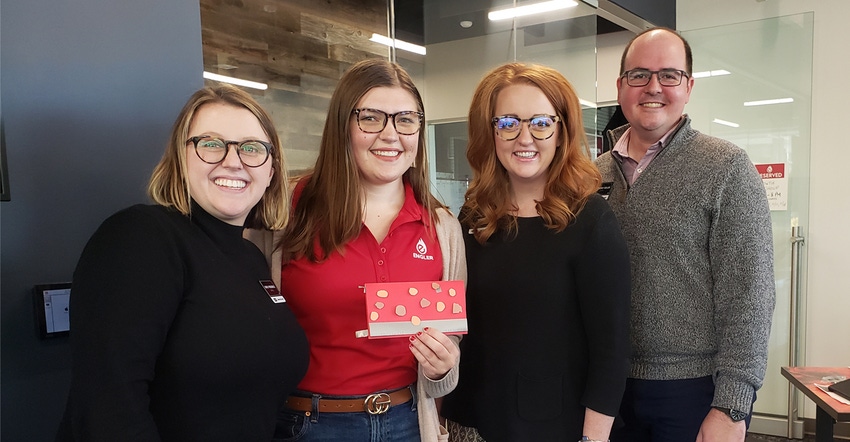
Kansas agriculture faced a leadership gap in 1989. Like so many other states at that time, Kansas needed to develop grassroots leaders to come together and find solutions to community problems.
In 1989, the first board meeting for what would become the Kansas Agriculture and Leadership Program, KARL, was held. The goal: to create an extensive educational program to grow a leadership base for rural Kansas. Since the first class of KARL Associates in 1991, more than 400 individuals from around the state have gone through the two-year program to explore the issues and opportunities in Kansas — and outside of the state as well.
KARL President Jill Zimmerman says in this fourth decade of KARL, the program has embarked on strategic visioning to help set its course to educate the leaders of tomorrow. The board of directors is making sure, she says, that KARL is delivering the education and tools that can help KARL Associates be better versions of themselves, and better help their communities and workplaces thrive in the future.
“The demands of the program are more than they were in 1989,” Zimmerman says. “But we certainly are not going to be bashful about staying the course and making the changes. We want to continue to be relevant. We do not want to be stale.”
Past meets future
The KARL model was based on a leadership training model promoted by the W.K. Kellogg Foundation in the 1960s and 1970s. The original Kellogg Farmers Study Program was created in 1965 at Michigan State University, with support from the WKKF. Its goal was to provide young ag and rural leaders with a bigger view of society — the challenges and opportunities beyond the farm gate. Those lessons and experiences gave them better context for local issues in their communities and their farm organizations.
KARL Associates gather for multiday seminars at locations across the state in their two-year class. They also travel to Washington, D.C., and Gettysburg, Pa., for a one-week seminar focused on national issues, as well as an out-of-state “Blue Chip” visit to a company or organization to see leadership in practice. Finally, each class caps off with an intense two-week international study tour.
Zimmerman says the KARL Program is adding education features that will help associates take those experiences and answer the “now what?” question. The program has added a Dale Carnegie course to the curriculum of each class, so that the experiences they’ve had can be placed into context and they can create plans of action for their communities and organizations.
“The second in terms of leadership development would be the inclusion of the Gettysburg leadership experience,” she says. It’s underwritten by Farm Credit Services of Kansas. The KARL class spends time on the battlefield, discussing the lessons of the Battle of Gettysburg and what they can take away from those lessons to use in their own lives.
The educational seminars have also been updated to better reflect the issues facing leaders of tomorrow. For example, KARL added a seminar in Hays, Kan., to focus on water issues in the state. Such topics as infrastructure needs in the state and just how critical rural broadband access is to rural Kansas are now covered.
Network-building
KARL is proud of the more than 400 graduates of the program, Zimmerman says, and their influence reaches far and wide. From college administration offices, to the top-level suites of major companies, to commodity and farmer organization boards of directors, to the halls of the Kansas Capitol and even the halls of Congress in Washington, D.C., you can find a KARL Fellow, she says.
“Ninety-one percent of our graduates serve in a leadership role,” Zimmerman says.
It’s the network building that happens in each class that is so valuable to employers, she adds. That’s the KARL magic, if you will. Bringing together diverse classmates from around the state, with their individual views, and providing an environment that fosters communication is key to leadership development, she says.
And it’s not just for those in production agriculture.
“When the W.K. Kellogg Foundation, all those many years ago, wanted to do this for rural communities, it was to provide an opportunity for learning for folks in production agriculture,” Zimmerman says. “Well, fast-forward to today, and we may have directors of chambers of commerce, they may work for a local hospital, they may be a lobbyist for healthcare.
“There’s a lot of folks in the room that still have a connection to what happens in the rural space,” she adds. “But maybe just not on a day-to-day basis.” And that is the probably the biggest adaptation of KARL in its four decades — adapting from a farmer-led program to one that covers many more diverse rural community needs beyond the farm.
Recruiting for the next class
Zimmerman says applications for Class XVI are now available at karlprogram.com/apply-nominate. If you know of someone who would be a good fit for the program, you can also fill out a nomination form on that website, and KARL will contact that individual to apply. Applications will be taken until April 1, and interviews for potential KARL Associates will be the first week of May. The class announcement will be June 4.
About the Author(s)
You May Also Like






